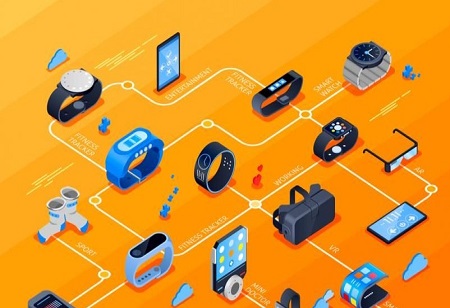Janifha Evangeline | Sunday, 11 September 2022

Wearable technology in healthcare is growing rapidly with several advanced features which are expected to offer significant advantages for pharma enterprises. Right from Fitbits tracking exercise to VR glasses and for identifying concussions in athletes, progression in wearable technology has made an impact on both the lives of patients as well as healthcare providers.
According to research from Business Insider Intelligence, with eighty per cent plus consumers who are willing to wear a fitness-tracking device the wearable technology has become a mainstream purchase for several consumers. Devices & connected apps for monitoring physical data has led to a healthier as well as lesser visits to the doctor and these are facilitating users for taking control of their own data.
Digital healthcare analyst Roxanne Balfe at the market intelligence firm GlobalData said: “A prominent shift is expected for wearable technology devices from the health and fitness segment, such as data storage and tracking devices, to using the technology for remote patient monitoring and big data applications. “Within five to ten years, it is expected that these devices in healthcare will become more disease-specific with therapeutic and diagnostic capabilities that will ultimately lower costs and increase efficiencies, moving towards a preventative model of healthcare.”
Why should pharma companies pay attention to the wearable industry Pharma companies which partner with an eHealth device manufacturer can witness higher savings in the cost of clinical trials while the clinical trial of wearable technology evolves into more universal in the clinical trial space. Medication reminders, medication wearable dosing technology & data collection will be accomplished remotely & this helps in saving on the cost of clinical trial personnel & is highly convenient for trial participants as well. Furthermore, pharma enterprises which build wearable technology that administers medicine or also partners with an enterprise that does, would witness increased market share for their injectables. This would negate the need for a physician office visit.
How the wearable technology will be integrated into the pharma system As wearable technology is evolving into more disease-specific with therapeutic as well as diagnostic capabilities, it will lead to lowering costs & increasing efficiencies states Global Data. While the wearable tech market was around USD 23 billion in the year 2018 it is now forecast to register a CAGR of nineteen per cent to reach USD 5 billion by the year 2023.
GlobalData estimates that pharma will lead to a fully integrated system in the wearable sector though it is part of a small proportion of the wearable technology sector currently. This is owing to pharma enterprises that are largely looking to digital solutions for decreasing costs & enhancing trial design & efficiency, and since the size as well as expense of physician-monitored clinical trials continues to grow.
One of the key areas which has seen a surge in the implementation of wearable technology is clinical research for pharmaceutical firms, since remote monitoring of patients in trials will not just lead to decreased costs for firms, but also more via the collection of real-time as well as real-world data, directly from patients. Apart from utilizing wearables for collecting rich pools of data for personalizing patient care & optimizing clinical trials, wearables can also help in promoting consumer health & preventative medicine.
And this will render access to patient data which will facilitate pharma firms in identifying trends & anomalies, or also to spot & act on reactions to use of drugs by patients. “The pharmaceutical industry will be able to drive to the next level of innovation and analytics, for example by using the data captured by wearables to more effectively monitor and analyse health metrics during trials and intervene where necessary. This personalised approach will provide physicians with the tools to make the best treatment decisions for patients,” states Balfe. “The power of wearables to capture a diverse array of health data remotely also offers the potential to speed up the drug development process, without compromising efficacy or safety. This will draw from its ability to collect data from patients around the world in real-time, whilst decreasing the burden of trial participation for patients themselves,” he adds.
How wearable tech will decentralize healthcare Owing to the failures of contemporary healthcare, most of the patients are already taking their health in their own hands. And social media platforms such as Facebook, & other sources of hive-mind information are unsuitable stand-ins for real physicians, but that is putting most of the vulnerable patients at risk further. Wearable technologies bring to the table the genuine healthcare to the houses of patients who would otherwise have rejected the modern medical establishment. Also, the patients who are completely compliant with contemporary allopathic medicine reap benefits from the decentralized approach to healthcare which the wearable tech is bringing about.
In a nutshell The pandemic has made it clear that centralizing healthcare in hospitals as well as in several other clinical cares is not just making it inefficient but also enabling the spread of the disease. While decentralization is becoming the rallying cry of technological development in the twenty-first century across various segments, the recent advancements in the healthcare benefits of wearable tech are enabling this transition in the direction of greater efficiency in medical care as well as freedom for patients further.